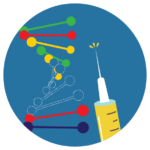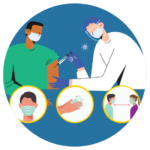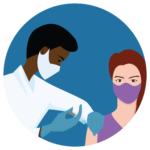This PowerPoint slide set was developed by iREACH Subject Matter Experts Dr. Yabo Beysolow and Lisa Jacques-Carroll to answer frequently asked questions about COVID-19 vaccine safety and dispel common myths about COVID-19 vaccines.
Feel free to download and customize for educational purposes, such as internal staff training, educating community members, and training trusted messengers.
Are the vaccines safe?
- The three authorized vaccines were developed in a faster than usual process, but all were extensively tested for both safety and efficacy and met FDA safety standards
- They will be carefully monitored to detect any problems or side effects
- Millions of people in the U.S. (and in other countries) have already received COVID 19 vaccines
Vaccine safety monitoring
- After a vaccine is authorized or approved for use, many vaccine safety monitoring systems watch for adverse events (possible side effects)
- This monitoring can pick up adverse events that may not have been seen in the clinical trials
- If an unexpected adverse event is seen, experts quickly study it further to assess whether it is a true safety concern, and then decide whether changes are needed in U.S. vaccine recommendations
COVID-19 Vaccine Safety
U.S. systems will monitor the safety and effectiveness of the COVID-19 vaccines after FDA approval.
New or expanded safety monitoring in the U.S. include:
- V-Safe: CDC’s new smartphone-based, after-vaccination health checker for people who receive COVID-19 vaccines.
- National Healthcare Safety Network (NHSN): An acute care and long term care facility monitoring system that report to VAERS.
- FDA’s Biologics Effectiveness and Safety (Best) System and FDA’s Sentinal System: Systems contain administrative and claims-based data for vaccine surveillance and research.
- Centers for Medicare and Medicaid Services (CMS’) Health Data: FDA and CMS collaboration that monitors the CMS health records database.
- Genesis: NIA/Brown University system to identify and track any adverse events after vaccination for nursing homes
- Health Data/Safety Monitoring Systems from Veteran Affairs, Department of Defense and Indian Health Service
Dispelling Common Myths About the Vaccine

You will not get COVID-19 from the vaccine.

The vaccine will not change or damage your genetic information.

Even if you are vaccinated, you should still wear your mask, frequently wash your hands and maintain a physical distance to help keep everyone safe.

The Pfizer, Moderna and Johnson & Johnson vaccines are all equally important in stopping the spread of COVID-19.

If you are pregnant, trying to become pregnant now or want to get pregnant in the future it is still safe for you to get the vaccine.
COVID-19 Vaccine: The Facts
Key Facts About COVID-19 Vaccination

Getting vaccinated can help prevent getting sick with COVID 19

People who have already gotten sick with COVID-19 may still benefit from getting vaccinated

COVID-19 vaccines will not cause you to test positive on COVID-19 viral tests*

COVID-19 vaccines cannot give you COVID-19
COVID-19 Vaccination will Help Protect You from COVID-19
Getting a COVID-19 vaccine…

Will help create an immune response in your body against the virus

People who have already gotten sick with COVID-19 may still benefit from getting vaccinated
Frequently Asked Questions
If I had COVID-19, do I need the vaccine?
Yes. People who had COVID-19 are recommended to get the vaccine after they have recovered.
Can a COVID-19 vaccine make me sick with COVID-19?
No. None of the authorized and recommended COVID-19 vaccines or COVID-19 vaccines currently in development in the United States contain the live virus that causes COVID-19. This means the COVID-19 vaccine can not make you sick.
There are several different types of vaccines in development. All of them teach our immune systems how to recognize and fight the virus that causes COVID-19. Sometimes this process can cause symptoms, such as fever. These symptoms are normal and are a sign that the body is building protection against the virus that causes COVID-19. Learn more about how COVID-19 vaccines work.
It typically takes a few weeks for the body to build immunity (protection against the virus that causes COVID-19) after vaccination. That means it’s possible a person could be infected with the virus that causes COVID-19 just before or just after vaccination and still get sick. This is because the vaccination has not had enough time to provide protection.
Can a person spread the virus after they are vaccinated against COVID-19?
The COVID-19 vaccines have been shown to be highly effective at preventing disease, but they might not prevent infection without symptoms. What this means is that if a vaccinated person can still be infected, even without symptoms, they could spread the virus.
Studies will soon be completed to determine whether this is possible. However, given this uncertainty, vaccinated people should still use masks and practice social distancing measures.
What if I have a pre-existing condition, like asthma or diabetes can I get the vaccine?
Adults of any age with certain underlying medical conditions are at increased risk for severe illness from the virus that causes COVID-19.
COVID-19 vaccines may be administered to people with underlying medical conditions provided they have not had a severe or immediate allergic reaction to any ingredients in the vaccine.
How long does immunity last from the vaccine?
We won’t know how long immunity produced by vaccination lasts until we have more data on how well the vaccines work.
What If I have an autoimmune disorder, can I get the vaccine?
People with autoimmune conditions may receive the authorized COVID-19 vaccines. However, they should be aware that no data are currently available on the safety of the COVID-19 vaccines for them. Individuals from this group were eligible for enrollment in clinical trials.
What if I have a weakened immune system?
People with weakened immune systems due to other illnesses or medication might be at increased risk for severe COVID-19 . They may receive a COVID-19 vaccine but be aware of the limited safety data:
- Information about COVID-19 vaccine safety for people with weakened immune systems is not yet available
- People with weakened immune systems should also be aware of the potential for reduced immune responses to the vaccine, as well as the need to continue following all current guidance to protect themselves against COVID-19
- Speak to your health care provider!
Is it safe for me to get a COVID-19 vaccine if I would like to have a baby one day?
Yes. People who want to get pregnant in the future may receive the COVID-19 vaccine.
Based on current knowledge, experts believe that COVID-19 vaccines are unlikely to pose a risk to a person trying to become pregnant in the short or long term. Scientists study every vaccine carefully for side effects immediately and for years afterward. The COVID-19 vaccines are being studied carefully now and will continue to be studied for many years, similar to other vaccines.
The COVID-19 vaccine, like other vaccines, works by training our bodies to develop antibodies to fight against the virus that causes covide-19, to prevent future illness. There is currently no evidence that antibodies formed from COVID-19 vaccination cause any problems with pregnancy, including the development of the placenta. In addition, there is no evidence suggesting that fertility problems are a side effect of any vaccine. People who are trying to become pregnant now or who plan to try in the future may receive the COVID-19 vaccine when it becomes available to them.
Find the latest COVID-19 resources
We are adding new resources every day. Check our resource library for more COVID-19 resources. Learn more about increasing vaccine confidence and dispelling incorrect vaccine information in the Vaccine Confidence Toolkit.
This resource is supported by the Centers for Disease Control and Prevention of the U.S. Department of Health and Human Services (HHS) as part of a Cooperative Agreement. The contents are those of the author(s) and do not necessarily represent the official views of, nor an endorsement, by CDC/HHS, or the U.S. Government.

